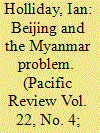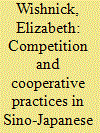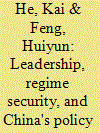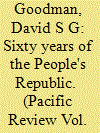|
|
|
Sort Order |
|
|
|
Items / Page
|
|
|
|
|
|
|
| Srl | Item |
| 1 |
ID:
091430


|
|
|
|
|
| Publication |
2009.
|
| Summary/Abstract |
The re-emergence of China as a major economic and political power has drawn attention to the role it might play in solving regional problems. Prominent among many Asian issues on Beijing's agenda is its southwestern neighbour, Myanmar, and in particular the military machine that has long ruled the country with an iron fist. The junta in place today is both acknowledged as problematic by policymakers in Beijing, and seen by the wider world as a regional challenge on which China should take the lead. However, there is little agreement on ways forward. To determine how Beijing might handle the Myanmar problem, this article first examines the concept of intervention, reviewing the manifold modes found in the contemporary world and drawing up a typology. Then it surveys arguments about intervention, focusing on perspectives that are relevant in this context. Next it presents arguments about intervention in Myanmar, and follows up by looking in some detail at China's current low-level engagement. Finally it considers where Beijing might go from here in dealing with Myanmar. The argument pulled together in the conclusion is that while nobody has a full solution to the Myanmar problem, a case for enhancement of China's role can be grounded not only in its global obligations, but also in precepts found deep in its national tradition. It is here that efforts to boost Beijing's engagement should be directed.
|
|
|
|
|
|
|
|
|
|
|
|
|
|
|
|
| 2 |
ID:
091427


|
|
|
|
|
| Publication |
2009.
|
| Summary/Abstract |
This article reexamines the conventional wisdom that characterizes Sino-Japanese energy relations as predominantly competitive, but views Sino-Japanese environmental relations as essentially cooperative. Using sociological theories of risk, it is argued that Sino-Japanese cooperation is more likely in both the energy and environmental areas when common risks are perceived and relative gains are minimized. Despite their many conflicting strategic, political, and economic interests, as energy importers who are vulnerable to supply interruptions in the Middle East and competitors for global energy supplies, China and Japan share common risks to their energy security. Consequently, there actually may be increasing opportunities for China and Japan to address their common concerns through bilateral and multilateral cooperative practices, such as common positions on pricing or energy conservation initiatives. Although one would expect China and Japan to highlight their mutual interests in tackling environmental problems such as air pollution, in fact relative gains often impede cooperation. Japan increasingly views China as an economic competitor and is reducing environmental aid, while China continues to set a priority on economic growth, which sets limits on the use of costlier Japanese green technologies. By examining a selection of scholarly articles, reports and newspaper articles by Chinese and Japanese analysts, as well as material from interviews in Beijing and Tokyo in May-June 2007, the paper shows how environmental and energy issues in Sino-Japanese relations may be framed as threats, requiring counter-measures, or common risks, which can be addressed through cooperative practices. Lastly, the paper discusses the possibility of the development of an energy security 'risk community' as cooperative practices develop between China and Japan. Nonetheless, conflicting political interests, strategies, and self-images, accentuating relative gains, may provide obstacles to their cooperation in both energy security and environmental protection.
|
|
|
|
|
|
|
|
|
|
|
|
|
|
|
|
| 3 |
ID:
091432


|
|
|
|
|
| Publication |
2009.
|
| Summary/Abstract |
In recent years, the government of the Philippines has engaged in efforts to encourage nonferrous metals mining as a means of accelerating economic development. Mining is an activity with a substantial potential for environmental degradation. Mining projects in the Philippines are subjected to an environmental impact assessment process that is designed to operate in the minimum amount of time and with the minimum amount of inconvenience to the project proponent. This process does not properly consider biodiversity, ethnodiversity, alternatives to the project, and the cumulative effects of the project. This process also avails a minimal amount of opportunities for members of the public to participate. This environmental impact assessment process is a tokenism designed to make it appear that mining projects are being assessed for their environmental effects while they receive their inevitable predetermined approval.
|
|
|
|
|
|
|
|
|
|
|
|
|
|
|
|
| 4 |
ID:
091431


|
|
|
|
|
| Publication |
2009.
|
| Summary/Abstract |
Traditional analyses of Taiwan crises have relied mainly on deterrence theory for their explanatory power. This approach fails to account for China's risk-taking behavior, which can be explained by prospect theory. We suggest that Chinese leaders are more likely to use more risky military coercion against Taiwan's pro-independence movements within a domain of losses, i.e., when their regime faces serious domestic and international challenges to its security. Conversely, Chinese leaders are more likely to employ less risky political pressure to oppose Taiwan's pro-independence forces if their decision making takes place in a domain of gains, i.e., when the security of China's regime is not challenged. We conclude that maintaining a good US-China relationship is the best strategy for the United States to help prevent military crises in the Taiwan Strait.
|
|
|
|
|
|
|
|
|
|
|
|
|
|
|
|
| 5 |
ID:
091428


|
|
|
|
|
| Publication |
2009.
|
| Summary/Abstract |
Although the People's Republic of China turns 60 in 2009, popular and to some extent academic perceptions of its political system remain over-determined by the experience of its first 30 years. The socio-economic impact of the policies of the last three decades is well recognised but not the context in which these have occurred. In particular, there is a tendency to differentiate sharply between dramatic economic growth and its consequences and the lack of political change. While it is clearly the case that the Chinese Communist Party remains in power it is equally as obvious that economic reform has had and been accompanied by major political change. Studies on the state in transition at local levels certainly suggest that change has been significant. Moreover, these local studies also indicate the need to further conceptualise understanding of the state in China. The state idea is rather too general a concept and too blunt an instrument for analysis compared to research that considers the state's values and ideology, the social base of political power, the structures and processes of the political system, the authoritative decision-makers, bureaucracy and administration, and the state's international interactions.
|
|
|
|
|
|
|
|
|
|
|
|
|
|
|
|
| 6 |
ID:
091429


|
|
|
|
|
| Publication |
2009.
|
| Summary/Abstract |
There is an underlying optimism in much of the literature that considers the emergence of social movements as being associated with deepening processes of democratization. The expansion of civil society is seen to expand political space. This paper takes a critical lens to this perspective, using recent political events in Thailand as a case study of the political strategies and alliances of social movements. We examine the debates that saw many social movements and their leaderships initially support elected Prime Minister Thaksin Shinawatra and his Thai Rak Thai Party only to see this support drain away as these same movements called on their followers to bring down the government. More importantly, we examine how these movements came to ally with conservative forces associated with the palace and military. Based on the Thai case study, we suggest that these seemingly unlikely outcomes result from the very nature of social movements. Leadership by middle-class activists, the need for alliances, the development of networks, and a focus on single issues and identities leads social movements to make substantial political compromises. The consequences can be negative for democratic development.
|
|
|
|
|
|
|
|
|
|
|
|
|
|
|
|
|
|
|
|
|